How to Preserve Zucchini Squash
Learn how to preserve zucchini for winter. Zucchini is a versatile vegetable for cooking and easy to grow in your garden. Sometimes it's too easy to grow, and you end up with entirely too many zucchini to use for the summer. Zucchini doesn't freeze or can particularly well, but here are some methods for preserving zucchini.
Zucchini Preservation Methods
When I say we had an overabundance of zucchini this year, I am not exaggerating. I've made all the zucchini recipes, and we still have quite a bit of zucchini left!
I'm sure my fellow gardeners also need some zucchini preserving ideas, so I decided to make one entire post devoted to zucchini preserve recipes.
What Do I Do With All My Zucchini?
If you are a first time zucchini grower, you may harvest a lot more zucchini than you anticipated. The question then becomes what to do with all of it without wasting any, especially with winter fast approaching.
This is why learning how to preserve zucchini for winter is so important. The best way to use up zucchini, besides eating it three times a day, is preserving zucchini through any of the methods that will soon follow.
If you need some recipes for fresh zucchini, here are some of my favorites:
- 54 Healthy Zucchini Recipes
- 19 of the Best Zucchini Bread Recipes
- 43 Zucchini Dinner Ideas
- 15 Zucchini Dessert Recipes
- 29 Vegetarian Zucchini Recipes
- 19 Zucchini Noodles Recipes
- How to Make Zucchini Fritters
- Flourless Chocolate Zucchini Muffins
- Chocolate Zucchini Cake Recipe With Applesauce
- Zucchini Pizza Bites
- Chocolate Zucchini Bread Recipe
- Zucchini Bread With Applesauce
What Is The Best Method For Preserving Zucchini And Squash For Later Use?
Learning how to preserve zucchini squash, and zucchini in general, can sound a bit complex. This is because there are lots of methods that you can use.
Ultimately, which method you choose to use for preserving zucchini will depend on how much zucchini you have, what appliances you have access to, and other such factors.
Why Is Canning Zucchini Not Recommended?
Oftentimes, canning zucchini is not recommended for one major reason. Zucchini is a very low acid vegetable, and acidity is a major part of the canning process.
Lower acid vegetables take much longer to can as to ensure that all harmful bacteria is eliminated. You can learn more about 11 canning mistakes that can kill you for more information about botulism.
Thus, it can be difficult to can zucchini as not canning it long enough can cause it to spoil, but canning it too long can also damage it. Due to the high heat and long processing times, your zucchini will turn into an unpalatable lump of zucchini.
However, there are a few safe zucchini canning recipes. This pineapple zucchini canning recipe is safe to water bath due to the acid in the pineapple juice. You can also water bath can a zucchini bread jam canning recipe.
Is It Better To Freeze Or Can Zucchini?
As previously mentioned, canning zucchini is not recommended.
Rather, freezing zucchini is a good method for preserving it, as there are many options at your disposal.
You can freeze zucchini in cubes, shredded, or in slices to use in cooking later. Learn how to freeze zucchini for more information about freezing it so it doesn't turn mushy.
This is why freezing zucchini is often recommended as a primary way of preserving it.
What Can You Use Frozen Zucchini For?
There are all sorts of things that you can do with frozen zucchini. Personally, I use zucchini in a lot of recipes, so I prefer to freeze it in small ready-to-go packages.
For instance, I freeze enough zucchini to make a loaf of zucchini bread in its own package. This way, whenever I want I can grab the bag, thaw it, and use it.
Frozen zucchini can be used in anything you would make with regular zucchini. However, it may lose some of its flavor and/or texture after being frozen. For this reason, I prefer to use frozen zucchini as an ingredient in recipes rather than on its own.
Frozen zucchini slices and cubes can also get watery when it thaws. I use the water in my zucchini bread because the recipes needs it.
However, for stir fry or fried vegetables, I pat the squash to remove excess water.
How Long Can You Freeze Zucchini?
Zucchini frozen fresh will last for about two or three months. When blanched and properly prepared, zucchini will last up to ten months.
Can You Dehydrate Zucchini?
Yes, you can dehydrate zucchini for later use. There are plenty of things that you can do with dehydrated zucchini.
You can make dehydrated zucchini chips, slices, or fries to be enjoyed on their own or in other recipes. I like to season sliced zucchini and eat it like a chip for a healthy snack.
Learn more about how to dehydrate zucchini. This has directions for a dehydrator, oven, and air fryer.
Dehydrated zucchini can also be used to make zucchini powder and flour. Learn how to make zucchini flour for a low carb flour alternative or thickener.
How Do You Freeze Dry Zucchini?
Preserving zucchini using a freeze drier is super easy to do. This was our first garden season with a Harvest Right freeze dryer, and I sure used it!
I was able to freeze dry 30 pounds of zucchini chunks for later. I'll add them to soups, stir fry, and whatever else I can manage to add them to.
Once your zucchini is washed and prepared, lay it out on the freeze dryer tray and place the tray in the machine. Then, all that is required is a way for the process to be done before sealing the zucchini in safe, long term storage containers.
I don't have a dedicated post about freeze drying zucchini, but it's similar to freeze drying fruit. Learn how to make freeze dried fruit at home.
A freeze dryer is an investment for a homestead, but it's the only way to preserve food for up to 25 years. Many people think that a dehydrator will preserve food for long term storage, but there's too much water left in the food for long term storage.
Learn about freeze dry vs dehydrated for more information.
Zucchini Preservation Methods
Here are some zucchini preserving ideas to help you preserve your harvest.
Canning
Typically, canning is not recommended for preserving zucchini barring a few specific recipes. This is because the canning process will turn your zucchini to mush, making it hard to use.
However, there are a few specific safe recipes that you can make with a canner using zucchini. For instance, you can easily make zucchini bread jam, pineapple zucchini, and zucchini relish using your canner.
Dehydrating
There are a few specific methods that you can use to dry your zucchini. You can dry zucchini in a dehydrator, in the oven, in an airfryer, or using a freeze drier.
Following are some deeper guides into each of those zucchini preservation methods that will give you some zucchini preserving ideas.
How To Preserve Zucchini Using A Dehydrator
Using a food dehydrator is super easy to do. Once you have your zucchini prepared, lay it all out on the tray. Try to avoid overlapping the zucchini so that air can flow through the machine.
Then, turn the dehydrator on and let it go until the zucchini is as dry as you want it to be. You can then store the dehydrated zucchini in an airtight container for a few weeks or vacuum seal it for longer storage.
I like to use the mason jar attachment for my vacuum sealer and store in mason jars.
How To Preserve Zucchini In The Oven
Using an oven for preserving zucchini takes more electricity than does using a dehydrator, but is still effective.
To begin, lay the zucchini out on a cookie sheet with parchment paper. Bake the zucchini at 135 degrees or whatever the lowest setting of your oven is for ten hours.
You can also bake at 200 degrees for seven hours, however, the zucchini will need to be more closely monitored so it doesn’t burn.
How To Preserve Zucchini In An Air Fryer
Air fryers are good for drying smaller batches of zucchini, plus it uses less electricity than an oven. To start, lay a single layer of zucchini out on the tray of your air fryer, avoiding overlap.
Then, cook the zucchini for about fifteen hours at 120 degrees. Be sure to check the zucchini often after the ten to twelve hour mark.
Learn more about how to dehydrate in air fryer.
How To Freeze Zucchini
Freezing zucchini is a straightforward process. To get started, wash and prepare the zucchini using your preferred method. You can do slices, strands, cubes, etc.
Then, you will need to blanch the zucchini. To do this, start by bringing a pot of water, unsalted, to a boil. Then, add the zucchini and let cook for a minute. Toss the zucchini into a bowl of ice water, which stops the cooking process, and the blanching is complete.
Freezing zucchini is not the preferred method for storing zucchini, as it slightly reduces taste and texture. As such, freezing is preferred for storing zucchini as an ingredient to other recipes, such as zucchini bread.
I hope you can use these zucchini preserving ideas.
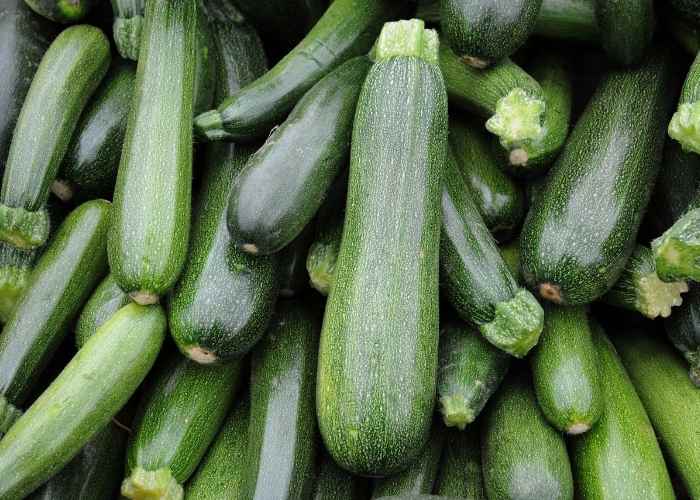





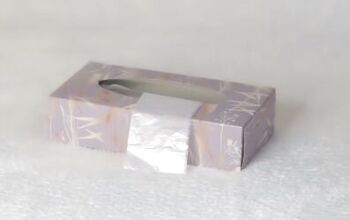
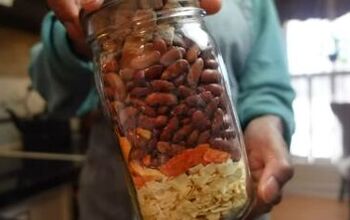





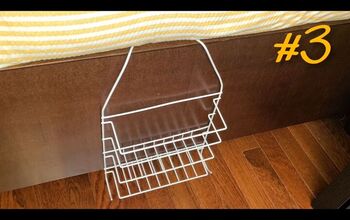
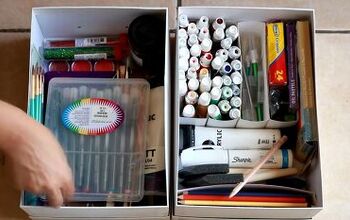



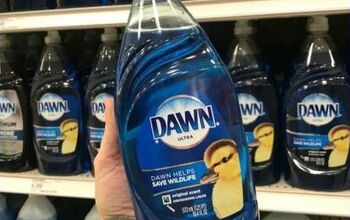


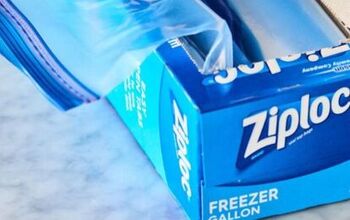

Comments
Join the conversation